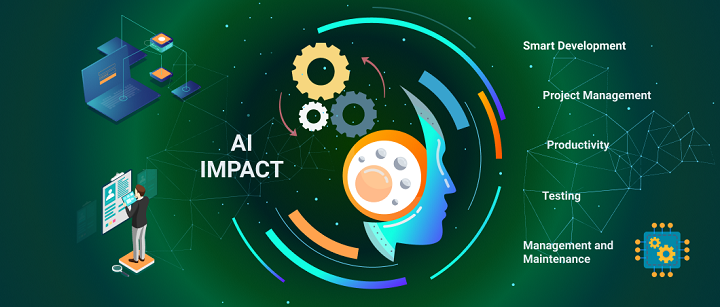Technology and globalization are closely tangled. The movement of goods, ideas, and people are accelerated and widened by new forms of communication as well as transport. And, in turn, technological development has been upgraded by the assortment of notions and the rising scale coming from global reach.
 During every phase of globalization, technology has played a pivotal role in shaping both perils and opportunities. Out of all, Artificial Intelligence is one such recent evolution that is becoming an integral driving force and is impacting globalization significantly.
During every phase of globalization, technology has played a pivotal role in shaping both perils and opportunities. Out of all, Artificial Intelligence is one such recent evolution that is becoming an integral driving force and is impacting globalization significantly.
Artificial intelligence (AI), therefore, is a technical term that refers to objects extensively being used to figure out contexts or the impacts of actions in response to the figured perspectives. The capacity for building such objects is increasing day by day. And with that, the effect that they have on global society is shooting up as well.
As the Internet of Things (IoT) branches out in the next few years, transforming how consumers work, think, and basically live will be possible with the age of omnipresent computing. By 2025, it is expected that there are going to be more than 100 billion connected devices.
This means that for every one person on the planet, there will be 14 devices. Together, all of these will be generating a revenue of approximately $10 trillion.
The New Technology and Global Data Handling:
The data creation scale in the current environment is too broad to imagine. However, there is no way you can escape data and find new methods to analyze and make use of the information without making the entire process as critical and challenging as it already is.
Coming to artificial intelligence, it acts like a key that reveals never-before-seen chances in data while simultaneously investing less time to drive insights from the data and execute the same for various tasks and procedures.
During the smartphone era, devices acted as a distraction. Going forward, as they multiply, artificial intelligence will be ensuring that they don’t continue to be abrasion and annihilation but instead add value to the given task.
In this new world, where AI will be human-centric, everything is operating at the peak of efficiency. Data has become easy to read; organizations are aligned around several units of the business; humans can skip manual tasks.
This reality is going to bring unparalleled opportunities to marketers, enabling them to capitalize with the help of advancements in the industry and expand into a completely new market with a major focus on workforce and exclusive strategies.
Marketing teams are no longer dealing with different customer data. Instead, they will be able to discover the methods through which delivery of frictionless, and personalized customer experience can be automated. And if they don’t, they are sure to lag.
The Present Scenario of Artificial Intelligence:
Artificial intelligence is powering several technologies and tools, which have been designed to dig into a massive amount of amorphous data.
Technologies like virtual agents, language generation, machine learning, natural language processing, sentiment analysis, and speech recognition, are significant in their applications and advantages across the globe.
With their expansion – be it stepping into new markets or adding new products to the existing list – marketers are going to test which of these technologies allows faster and low-cost results. Not just marketers would have to keep up with the astonishing speed of product development, but they also require an inexpensive way to tap into those markets that have more risk to justify the reasons behind expanding the investment.
Adding more to it, marketers also have to learn how these technologies are going to offer global customers a personalized experience. There’s no question that AI has been beneficial to creating a more customer-centric experience such as capturing contract metadata, deriving meaningful insights from raw data, etc.
The Importance of Personalized Experiences:
The demand and need for personalization have become quite conventional. Backed up by in-depth knowledge of customers’ needs, habits, and preferences, Artificial Intelligence can be used to forecast future behavior and create a more personalized experience with these predictions.
This can result in delivering precise content, across all the channels, at the right time, to the right set of customers. Another essential application of machine learning is to differentiate customers into individuals.
Predictive analytics can restructure digital advertising with real-time data and discovering the sentiments of a customer before they make a purchase; hence, providing them with explicit content as well as recommendations.
Also Read: A guide to starting Artificial Neural Network
And then, there turns out to be Audio Voice Control, which is a new doorway to digital applications. Consumers across the world are embracing intelligent personal assistants like Cortana and Siri, only because they are user-friendly, efficient, and secure – everything that a customer requires and what AI can provide.
And therefore, the next step here would be making this technology work faultlessly and investing more in the next generation voice interfaces to create a better experience.
The Next Generation:
Organizations that are increasingly establishing their footprint globally in a competitive environment, innovations of artificial intelligence are going to bring exciting possibilities. In the coming years, virtual reality can pump up new life into cooperative content or improve the way products are being tested.
Another initiative that lately obtained a lot of attention is cloud artificial intelligence platforms that help marketers optimize content. There is no denying the fact that gathering large, uncomprehending volumes of data available is definitely a challenge. And for the human brain, alone, it turns out to be impossible.
But considering that data is driving performance, it is making sense that machine intelligence is an appropriate choice to enhance traditional tasks to a great extent. Grasping artificial intelligence from a human-centered perspective, data quality should be improved to alleviate the actionable output from marketing.
Resource optimization can also be the next significant step. Assigning the right type of projects to the correct type of people for creating precise content can be difficult. However, machine learning can identify which employee has the proficiency to carry out a specific task efficiently – not just with less supervision but with adequate support from machine learning.
So, while artificial intelligence and other similar technologies have an inevitable impact on globalization, its advantages and drawbacks can easily be segregated. Just with every significant change, people are having a tough time adjusting to AI and its automation.
However, over time, their comfort level will increase, and their dependency on technology is going to reach a significant scale – from where turning back will seem impossible.




Leave a Comment